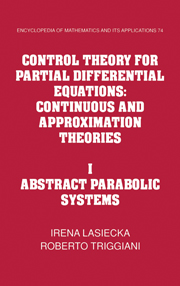Book contents
- Frontmatter
- Contents
- Preface
- 0 Background
- 1 Optimal Quadratic Cost Problem Over a Preassigned Finite Time Interval: Differential Riccati Equation
- 2 Optimal Quadratic Cost Problem over an Infinite Time Interval: Algebraic Riccati Equation
- 3 Illustrations of the Abstract Theory of Chapters 1 and 2 to Partial Differential Equations with Boundary/Point Controls
- 4 Numerical Approximations of Algebraic Riccati Equations
- 5 Illustrations of the Numerical Theory of Chapter 4 to Parabolic-Like Boundary/Point Control PDE Problems
- 6 Min–Max Game Theory over an Infinite Time Interval and Algebraic Riccati Equations
- Index
4 - Numerical Approximations of Algebraic Riccati Equations
Published online by Cambridge University Press: 05 June 2013
- Frontmatter
- Contents
- Preface
- 0 Background
- 1 Optimal Quadratic Cost Problem Over a Preassigned Finite Time Interval: Differential Riccati Equation
- 2 Optimal Quadratic Cost Problem over an Infinite Time Interval: Algebraic Riccati Equation
- 3 Illustrations of the Abstract Theory of Chapters 1 and 2 to Partial Differential Equations with Boundary/Point Controls
- 4 Numerical Approximations of Algebraic Riccati Equations
- 5 Illustrations of the Numerical Theory of Chapter 4 to Parabolic-Like Boundary/Point Control PDE Problems
- 6 Min–Max Game Theory over an Infinite Time Interval and Algebraic Riccati Equations
- Index
Summary
This chapter provides, in the analytic case, a numerical approximation theory of the optimal quadratic cost problem over an infinite time interval whose continuous counterpart was studied in Chapter 2. Assumptions and notation of Chapter 2 are essentially retained. Because of the additional complexity in notation in the discrete case, a glossary of symbols is provided at the end of the chapter. Particular emphasis is placed on approximating the Riccati operator P, the gain operator B* P, the optimal controls u0, the optimal solution y0; etc. This is provided by the main Theorems 4.1.4.1 and 4.1.4.2, which apply to any consistent approximation scheme. They provide, generally, rates of convergence. Under the general setting of Theorems 4.1.4.1 and 4.1.4.2, the rates of convergence are not optimal, however. A more specialized theory, to be presented in Section 4.6 (Theorems 4.6.2.1 and 4.6.2.2), provides optimal rates of convergence. Applications of these results to several examples of partial differential equations of parabolic type with boundary/point control will be given in the subsequent Chapter 5, where numerical schemes will be presented where all the assumptions required by Theorems 4.1.4.1 and 4.1.4.2 will be satisfied. In addition, however, Chapter 5 will provide numerical schemes that will guarantee optimal rates of convergence in the case of the heat equation with Dirichlet or Neumann boundary control according to Theorems 4.6.2.1 and 4.6.2.2.
- Type
- Chapter
- Information
- Control Theory for Partial Differential EquationsContinuous and Approximation Theories, pp. 431 - 510Publisher: Cambridge University PressPrint publication year: 2000



